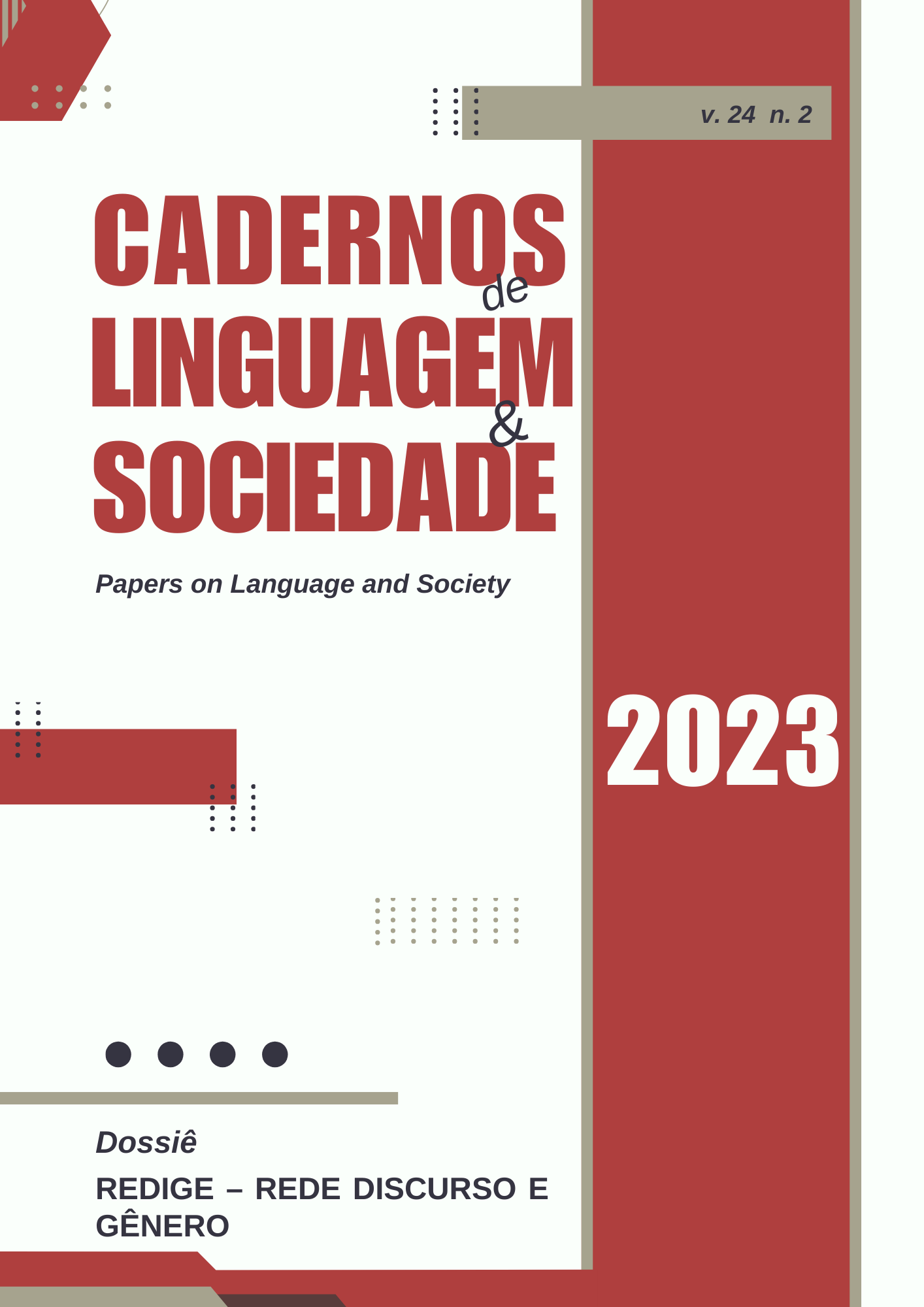RÉFLEXIONS PÉDAGOGIQUES SUR LES PERCEPTIONS COLONISÉES DES PORTUGAIS
DOI :
https://doi.org/10.26512/les.v24i2.46912Mots-clés :
Interculturalidad, Sociolingüística, Didáctica de las LenguasRésumé
Téléchargements
Références
BAJTÍN, M. J. La estética de creación verbal. México: Siglo XXI, 1982.
BEARE, K. Teaching English to absolute and false beginners. ThoughtCo, 27 dic. 2020, 2016. Recuperado de: http://esl.about.com/od/esleflteachingtechnique/a/t_afbeginners.htm.
BOLÍVAR BOTÍA, A.; DOMINGO, J.; FERNÁNDEZ, M. La investigación biográfico-narrativa en educación: Enfoque y metodología. Madrid: La Muralla, 2001.
CAMBRA, M. Une approche ethnographique de la classe de langue. París: Didier, 2003. (Collection L.A.L.)
CARRASCO PEREA, E. Introduction. In: CARRASCO PEREA, E. (coord.). Intercompréhension(s): repères, interrogations et perspectives. Synergies Europe, 2010. V. 5, p. 7–12. Disponível em: http://ressources-cla.univ-fcomte.fr/gerflint/Europe5/ introduction.pdf
ENGESTRÖM, Y. Activity theory and individual and social transformation. En ENGESTRÖM, Y.; MIETTINEN, R.; PUNAMÄKI, R. Perspectives on activity theory. Nueva York: Cambridge University Press, 1999a. p. 19-38.
ENGESTRÖM, Y. Expansive visibilization of work: an activity theoretical perspective. En Computer Supported Cooperative Work, 1999b. p.63-93, v. 8.
HELGESEN, M. False beginners: activating language for accuracy and fluency. The Language Teacher, v. 11, n. 14, p. 23-29, 1987.
JIN, L.; CORTAZZI, M. La cultura que aporta el alumno: ¿puente u obstáculo? En BYRAM M.; FLEMING, M. Perspectivas interculturales en el aprendizaje de idiomas. Enfoques a través del teatro y la etnografía. Madrid: Cambridge University Press, 2001. p. 104-125.
JODELET, D. La representación social: fenómenos, concepto y teoría. In: MOSCOVICI, S. Psicologia social II. Barcelona: Paidós, 1984. p.469-493.
KALAJA, P. A review of five studies on learner beliefs about Second Language Learning and Teaching: Exploring the possibilities of narratives. In: JAKONEN, T.; JALKANEN, J.; PAAKKINEN, T.; SUNI, M. (ed.). Kielen oppimisen virtauksia. Flows of language learning. Jyväskylä: AFinLA, 2015. p. 21-38.
KALAJA, P. Student teachers’ beliefs about L1 and L2 discursively constructed: A longitudinal study of interpretative repertoires. En KALAJA, P.; BARCELOS, A. M. F.; ARO, M.; RUOHOTIE-LYHTY, M. (ed.). Beliefs, agency and identity in foreign language learning and teaching. Basingstoke: Palgrave Macmillan, 2016. p. 97-123.
KALAJA, P.; DUFVA, H.; ALANEN, R. Experimenting with visual narratives. En BARKHUIZEN, A. G. (ed.). Narratives in Applied Linguistics. Cambridge: Cambridge University Press, 2013. p. 1-26.
KERBRAT-ORECCHIONI, C. Les Interactions Verbale, 1. París: Armand Colin, 1990.
KERBRAT-ORECCHIONI, C. Les Interactions Verbales, 2. París: Armand Colin, 1992.
KERBRAT-ORECCHIONI, C. Analyse du discourse en interaction. París: Armand Collin, 2005.
LURIA, A. R. Higher cognitive functions in man. Nueva York: Plenum Press, 1980.
MARTÍN PERIS, E. Características de una programación comunicativa y su repercusión en el aula. In: Jornadas Internacionales de Didáctica de ELE. Madrid: Ministerio de Cultura, 1987. p. 39-58.
MARTÍN PERIS, E. La enseñanza de idiomas modernos: de los contenidos a los procesos. En Cable, 1988. p. 16-21, v. 1.
MARTÍN PERIS, E. El perfil del profesor de español como lengua extranjera: necesidades y tendencias. In: MIQUEL, L.; SANS, N. (coord.). Didáctica de E/LE 1. Actas del Congreso Expolingua. Madrid: Fundación Actilibre, 1993. p. 167-180
MARTÍN PERIS, E. El profesor de lenguas: papel y funciones. In: MENDOZA FILLOLA, A. (ed.). Conceptos clave en didáctica de la lengua y la literatura. Barcelona: SEDLL/ICE/HORSORI, p. 87-100. 1998.
MARTÍN PERIS, E. ¿Qué significa trabajar en clase con tareas comunicativas? En RedELE, 2004. Recuperado de: http://www.sgci.mec.es/redele/revista/martin.htm.
MARTIN PERIS, E. et al. (2002). Diccionario de términos clave de ELE. Madrid: Ministerio de Educación, Cultura y Deportes.
PAVLENKO, A. Autobiographic Narratives as Data in Applied Linguistics. Applied Linguistics, v. 2, n. 28, p.163-188, 2007.
PEATY, D. False beginners: who are they and what to do with them. The Language Teacher, v. 11, n. 14, p. 4-5, 1987.
PEREIRA, M. E. Psicologia social dos estereotipos. São Paulo: E P. U., 2002.
PÉREZ SERRANO, G. Investigación cualitativa. Retos e interrogantes. I. Métodos. Madrid: Editorial La Muralla, 1994.
SWAN, M. False beginners. In: JOHNSON, K.; MORROW, K. (ed.). Communication in the classroom. London: Longman, 1981.
VICENTE DA SILVA MATOS, D. C.; RODRIGUES BOTELHO, G. “Isso vai dar samba: a perspectiva afrogênica e decolonial pela linguística aplicada”. Cadernos De Linguagem E Sociedade, v. 21, n. 1, p. 120–137, 2020. DOI: https://doi.org/10.26512/les.v20i3.28457
VYGOTSKY, L. S. Mind in society: The development of higher psychological processes. Cambridge: Mass Harvard University Press, 1978.
VYGOTSKY, L. S. Pensamiento y Lenguaje. En Obras escogidas II. Moscú: Editorial Pedagógica, 1982.
WALSH, C. Interculturalidad, Estado, Sociedad. Luchas (de)coloniales de nuestra época. Quito: Universidad Andina Simón Bolívar / Abya-Yala, 2010.
WERTSCH, J. Voices of the mind: A Sociocultural approach to mediated action. Cambridge, MA: Harvard University Press, 1991.
Téléchargements
Publié-e
Comment citer
Numéro
Rubrique
Licence
(c) Tous droits réservés Cadernos de Linguagem e Sociedade do Programa de Pós-Graduação em Linguística da UnB é licenciado sob uma Licença Creative Commons Atribuição-Uso não-comercial-Vedada a criação de obras derivadas 3.0 Unported. 2023

Cette œuvre est sous licence Creative Commons Attribution 4.0 International.
Autores/as que publicam nesta revista concordam com os seguintes termos:
Autores/as mantêm os direitos autorais e concedem à revista o direito de primeira publicação, sendo o trabalho simultaneamente licenciado sob a Creative Commons Attribution 4.0 International license que permite o compartilhamento do trabalho com reconhecimento da autoria do trabalho e publicação inicial nesta revista.



